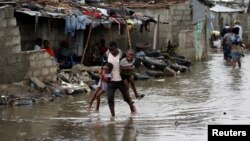The U.N. children’s fund reports nearly half of the 1.7 million people affected by Cyclone Idai in southern Africa are children.
The official number of deaths across the region has now risen to over 700. But this figure is expected to increase once the waters have receded and the bodies of those who have drowned and gone missing are found.
Conditions in Mozambique, Malawi and Zimbabwe remain critical. Thousands of people are still trapped by the flood waters, many huddled on rooftops and in trees waiting to be rescued.
The U.N. children’s fund reports the situation for hundreds of thousands of children caught up in this monumental storm is particularly dire. It says many do not have adequate shelter and are in urgent need of food and safe drinking water.
UNICEF spokesman, Christophe Boulierac says children are particularly susceptible to infectious diseases.
“Without safe and effective water, sanitation and hygiene services, children are at high risk of preventable diseases including diarrhea, typhoid and cholera, and also increasingly vulnerable to malnutrition,” he said.
The International Federation of Red Cross and Red Crescent Societies reports cases of cholera have been confirmed in the city of Beira in Mozambique, the epicenter of the cyclone. It warns the risk of outbreaks of malaria, water-borne and infectious diseases is high due to the prevailing conditions.
UNICEF reports many schools and hospitals have been destroyed or damaged or are being used as collective shelters. As a consequence, thousands of children are unable to go to school. It says it is crucial for children to go back to the classroom as soon as possible.
Officials explain many children are suffering from physical and emotional distress. They say school provides them with a structure and a sense of normalcy that can help them better deal with their anguish in this time of extreme chaos.




